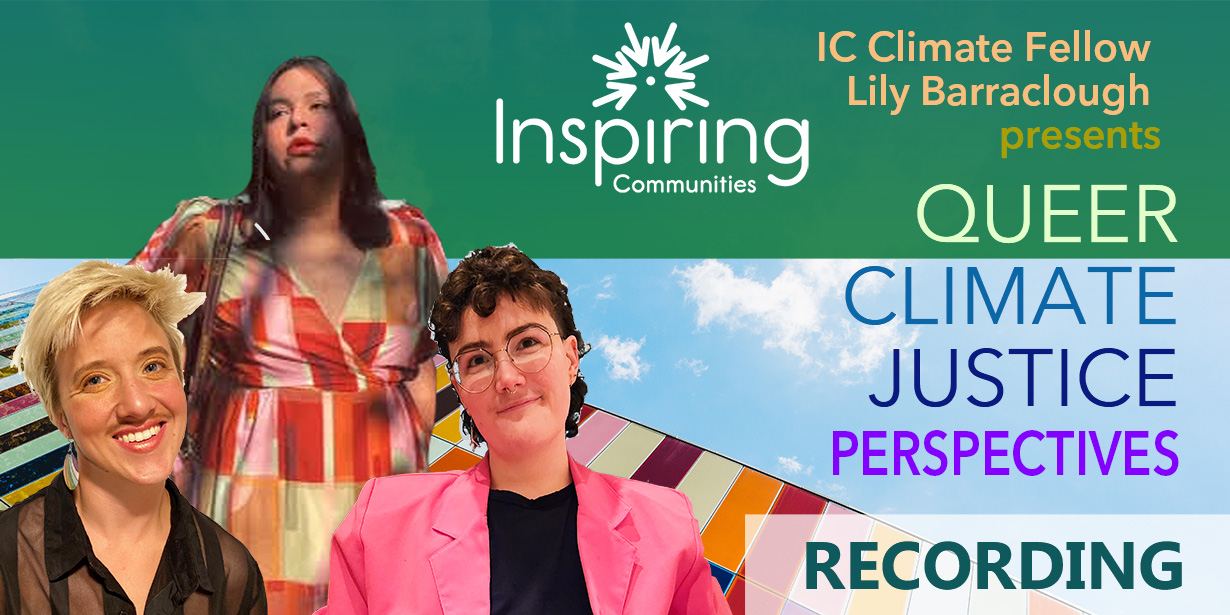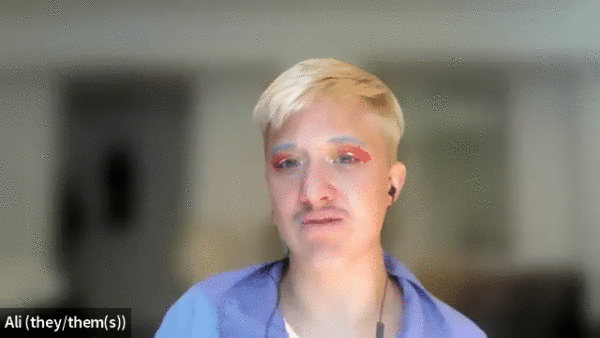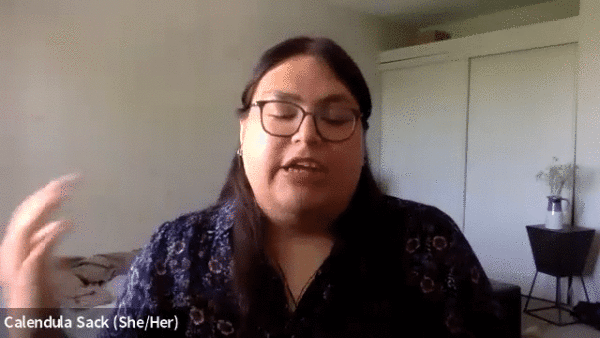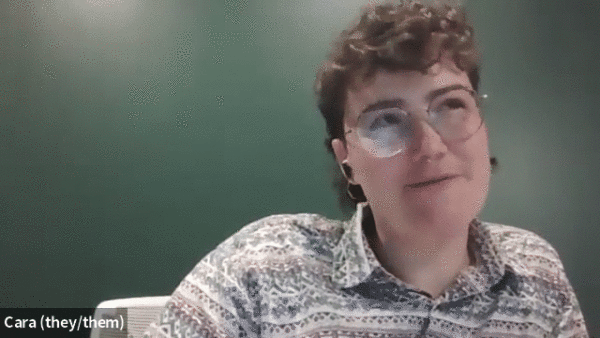Queer Climate Justice Perspectives

Policy, Community Organizing, and Lived Experiences
We are grateful to HCi3: Halifax Climate, Investment, Innovation and Impact Fund for their support of this fellowship, and for making this panel possible.
The panel was held on June 22, 2023 after out of control wildfires caused a postponement. This underlining of the importance of climate activism was not lost on our panelists.
Highlights from the meeting chat:
- José Esteban Muñoz: “Queerness is a structuring and educated mode of desiring that allows us to see and feel beyond the quagmire of the present. The here and now is a prison house… we must dream and enact new and better pleasures, other ways of being in the world, and ultimately new worlds.”
- “Bringing our whole selves to our work should be natural.”
- “There can be no climate justice without equity & redistribution / with billionaires and the capitalist unfair structure of heteronormative patriarchy.”
- “Looking for the wisdom of my ancestors. There was no point / no sense in the past in differentiating between queer / straight, etc.”
- “Existence is a form of resistance. My rights as a queer person exist outside the bounds of law.”
In response to the question “How is climate change affecting your mental health?”
- I see young people becoming nihilistic.
- Combating nihilism with help of Elders: The planet will be okay, with or without us. The flowers will regrow.
- I really want to be a mom — but I worry about the future for my children. So I won’t.
- I work to recognize when the work I am engaged in is impacting my health / out of alignment with my values.
- The false scarcity mindset that capitalism tries to convince us of is a huge contributor to poor mental health. I aim to push back on it and lean into community.
- Community matters: gentleness, kindness and surrounding ourselves with people who will monitor us and let us know when they see us being affected.
- A lifetime of awareness of climate change has informed a lot of my personal decisions – ie, my degree (climate science). You learn these facts in a way that is not trauma informed, no cultural competency, no respect for lived experience.
- feeling that MORE people need to take on the work to SPREAD OUT the work load… and ‘privileged’ people (that can be interpreted many ways) could take on more…
The planet will be okay, with or without us. The flowers will regrow.
On activism:
- “Just do it” is one thing, but it gets exhausting, trying to fight all the systems. Now, I am a ‘recovering activist’.
- Climate justice – it is UNJUST to ignore your own mental health to try to achieve your activist ends.
- Activism can be healing, but you need space for reflection and healing. For hope.
- Self-awareness is important. We need white bodies on the front lines, sure, but activism is something I’m constantly engaging in, regular conversations, having breakfast!
On strengthening community ties and resilience:
- I am at a point where I am prioritizing relationships over ‘obligations’.
- Making things accessible to those with the greatest struggle will make them accessible to all.
- Making space to share space with people is important to me. Acknowledging my privilege, and being accountable and expecting the same in others.
- Coming from a very small town in PEI where no distinction was made between siblings and cousins set my expectations for welcoming and inclusiveness – always set an extra plate, draw a wide circle.
- Basis of resilience: Family (however you define that)… means you are better able to navigate the hard things
- We don’t always talk about power and oppression in this discussion! – this is frustrating as an Indigenous person. Like, we’ve been talking about this for a loooooooooong time. I come from a line of water protectors.
- Someone wants to invite me into the circle, as if Indigenous folk didn’t create the circle originally.
- I want people to recognize their own power and what that means for them in building relationships with racialized people.
- Shout out to RISE / Apathy is Boring! https://www.apathyisboring.com/
- Research finding: International students take FOUR YEARS to make a friend. Be the person to invite someone in. Be inviting, kind, patient. Build connections.
- One of the great privileges of my graduate school experiences (almost a decade in Ontario) was the friendships I made along the way, many of them with International students in my student associations.
Existence is a form of resistance. My rights as a queer person exist outside the bounds of law.
Connecting with nature:
- Hustle & grind culture has been bad for maintaining connections with each other and nature. Having no balcony is hard!
- Accessibility can be a huge issue (distance, gravel, muddy hills, cost)
- Also the paved paths if they’re too thin it’s difficult to maneuver with a mobility aid because of other people who are there. Also if there are too many people on the trail it makes it scary because Covid is still a thing and these people are too close to me and think its okay because “we’re outside.”
- Living in a fat body affects your ability to connect uninhibitedly with nature in a city. Retreats are great though!
- Change how we are framing ‘in nature’… normalize the sense that we do not need to be in deep forest for it to be ‘real’ nature.
- Knowledge hoarding is real — there are people who don’t share their amazing knowledge. Share your knowldge of nature!
On homophobic arguments based on “natural” / “biological” / “science”
- There are always science-based arguments… my humanity shouldn’t be based on what you think of animals.
- Often those using biology in their arguments fail to even meet their own standards. They don’t know their own history. What is “natural”?
- The adaptability of nature (like when animals change genders as required) is a great model to follow in considering climate change action writ large — adapt like nature does!
- Paraphrase: Colonialism got no business talking about “natural”
My humanity shouldn’t be based on what you think of animals.
On revolution and our roles in it
- Some roles: Front lines folks, organizers / strategizers. Caretakers. Educators / teach new ways of being
- Mia Mingus! https://leavingevidence.wordpress.com/about-2/
- I don’t frame my world in revolution terms. My role is to make space / offer shelter to support our allies / friends / love ones.
- A role as one of the people who makes space for other voices and stories to be shared and heard.
- My role is to sit down, shut up and listen. I don’t think I am an expert on anything. I’m good at a lot of ‘little weird things”. The value I bring is in listening. I want to be Calendula’s student!
Parting thoughts
- Calendula asks: What would you put in your garden if you had one in your backyard? Is there tomatoes? (there should be tomatoes).
Panelists

Ali Mackellar (they/them) is a white genderfluid/trans settler living as a guest between the territories of the Skwxwú7mesh and Mi’kmaq peoples. They are participating in research based out of Kjipuktuk that is trying to understand the ongoing impacts of resource development and extractivism on 2SLGBTQQIA+ peoples in so-called Canada.

Calendula Sack (she/her) is an L’nu & Nehiyaw, Two-Spirit trans woman from Sipekne’katik, Indian Brook Reservation. She is currently living and thriving in Kjipuktuk (Halifax) on the unceded/unsurrendered lands of Mi’kma’ki. Calendula works as the BIPOC Support Services Educator at the Halifax branch Youth Project & she is the recipient of the Candy Palmater Award in 2022.

Cara MacKenzie (they/them) is a queer and trans environmental professional from Epekwitk (PEI). Their interest in queering climate justice stems from their professional, academic, and personal experiences navigating both queer and climate justice work as mutually exclusive streams. They currently work as an environmental program developer, grant writer and policy researcher.
Share this:
Comments are closed